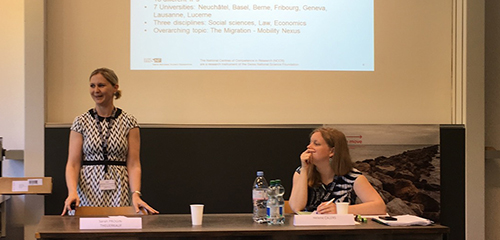The Regulation of the Immigration of the Low Skilled and Unskilled Labor Force in Switzerland and in the EU.
An Epilog.
On 22 June 2016, a workshop on the regulation of the immigration of low-skilled labor force in Switzerland and the EU was organized by members of the nccr – on the move, taking place at the University of Fribourg (Switzerland). Participants in the workshop were (in order of their presentation): Ms. Helene Calers (European Commission, DG Migration and Home Affairs), Ms. Gloria Moreno-Fontes (International Labor Organization ILO, Labor Migration Branch), Professor Petra Herzfeld Olsson (Uppsala University), Mr. Martin Hirsbrunner (Head of Free Movement of Persons Department, Swiss State Secretariat for Migration), Professor Tesseltje de Lange (Tilburg University), and Mr. Tobias Heiniger (Swiss Refugee Council).

Professor Sarah Progin-Theuerkauf welcoming the workshop participants before handing over to Helene Calers, EU Commission.
The morning program of the workshop focused predominantly on the EU’s Seasonal Workers Directive (Directive 2014/36/EU). The directive has been presented as a possible solution to the constant need for supply of labor force for seasonal work in the European market, offering a legal way for low-skilled workers to enter and stay in the EU as well as minimum standards of protection for these workers during their stay in the EU. Should the Directive be implemented fully and correctly by the Member States, it has the potential to significantly change the working and living conditions of many (potential) labor migrants. However, doubts about the effectiveness and the practical use of the Directive have already been raised. The morning program resulted in a detailed analysis of the Directive.
As the afternoon program showed, the Directive – or indeed any legislation on the entry and stay of seasonal (low skilled) labor force – does not serve as an example for Switzerland. Switzerland had abolished the seasonal workers’ status in 2002 and, at present, does not consider its reintroduction. Apart from the EU citizens who have a right to come and work in Switzerland in almost any sector due to the Bilateral Treaties with the EU, Swiss migration law provides solely for the immigration of highly skilled workers. Nevertheless, recognized refugees and those persons that have been granted temporary protection status are encouraged to take up work. Next to that, several programs for the regularization of undocumented migrants present (and working) in Switzerland are evaluated.
The discussion benefitted a lot from the participants’ interdisciplinarity and institutional backgrounds, which opened new perspectives on the various questions.
Margarite Helena Zoeteweij, nccr – on the move, PostDoc on the project “The Emergence of a European Law on Foreigners”
Lucia Della Torre, nccr – on the move, PostDoc on the project “Regulating “New” Migration within the Traditional Framework”

